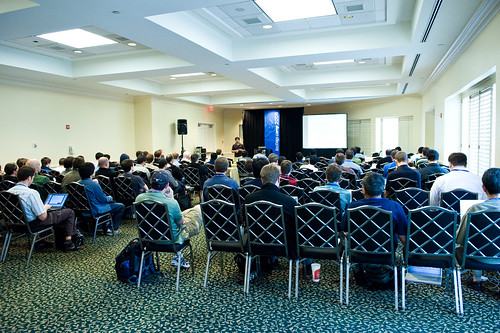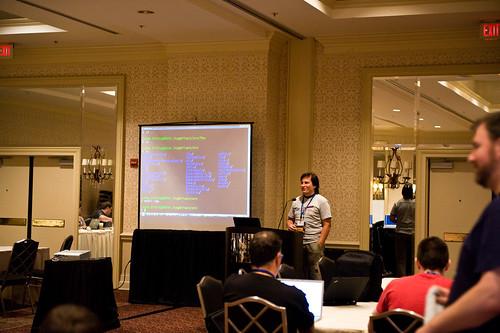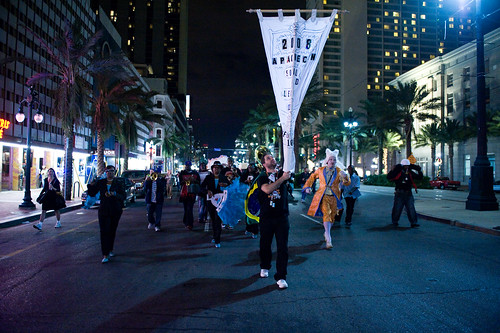ApacheCon US has come and gone for 2008, and here’s the roundup.
Talks
I’ve known Simon Phipps since we worked together at IBM in the late 1990’s. He’s always been great at finding and articulating trends in the computer industry, and I had read his post on the Adoption Led market. I expected him to talk about just that one issue, but it turned out that he had five points to make. Besides the adoption led characterization of open source, he talked about substitutability as preferable to interoperability, with a corollary of standards body reform. He also made the point that effective marketing messages for open source will be either first or second derivatives of freedom. I’m still doing some pondering on some of these.
Kevin Crowston from Syracuse University has been coming to ApacheCons for five years now, and I was very interested in his talk summarizing some of the things that he and his students have learned. I had a very extended in person conversation with Kevin, and it’s hard for me to remember what content came from where. Kevin and his students have really become a part of the ApacheCon community – I always look forward to talking to them and seeing what they are finding interesting. As I’ve written in other posts, the social/cultural/organizational lessons of open source development will likely turn out to be more enduring than much of the actual software.

It’s fashionable for some company to be controlling the ASF. Every year it is a different company. Over the years this honor has been held by IBM, Google, and Joost. This year, I would say that the honor belongs to Yahoo. There was an entire track dedicated to Hadoop, which originated with Yahoo. Many of the Hadoop sessions were jam packed, so Hadoop contributed substantially to the attendance at ApacheCon this year. I predict that nextt year’s Hadoop Camp will be double or even triple the size of this years’ track. The talk that I got the most out of was Dhruba Borthakur’s description of the way that they use Hadoop at Facebook.
The conference
I think that I’ve only missed a single US ApacheCon (I’ve never made it to an EU ApacheCon) since 2000. This year, there were some changes to the conference structure. In addition to the Hadoop Camp track, there was also a track for OFBiz. I didn’t attend any of the talks, but from talking to people, it seems that the OFBiz track also contributed heavily to the attendance. ApacheCon’s program is determined pretty much by who submits and that can lead to a very haphazard program. I think that the success of two well planned coherent tracks is something that should influence the direction of the conference. The conference needs whole or half day tracks which are technically coherent and which accommodate the skill levels of the various Apache user bases.

Another experiment was the decision to run a BarCamp during the second day of the Hackathon. I think that this was very successful. We had a very good discussion on git versus subversion, a topic that is generating a lot of interested within the foundation. There was a session on dynamic languages, which wasn’t very successful because the organizer ran through a long slide deck rather than engaging the participants. I ran a session on digital photography, and the people who participated seemed to get some value out of it. I would love to see a BarCamp, Open Space, or similar track be included in the main conference, rather than being limited to just the Hackathon.

The lightning talk session is always well attended. The ApacheCon lightning talks are decidedly biased towards the light hearted (like Aaron Farr’s hilarious portrayal of Apache world domination), in contrast to the PyCon lightning talks, which tend to be more serious. I think that the Python community is gettting more bang for the buck when it comes to the lightning talks. There’s much more dissemination of information that might be hard to get accepted as a conference talk, either because it’s a tidbit, or it’s very new work, for example. The demand is so great that there are multiple days of lightning talks – a sign that something is working really well.
There were two other unusual features of ApacheCon this year. The first was that it took place during this year’s historic U.S. election. I’ve never watched election returns much, and never with a group. The whole experience of sitting in the Sheraton bar/lobby and watching the events on a huge TV screen is one of those memories of a lifetime.

The other unusual happening took place at the end of the lightning talks, where a few of the sponsors got together and organized a “death of proprietary software parade”, complete with brass band and a police motorcycle escort as we marched through a few New Orleans streets. The parade’s final destination was a local club for the ensuing “celebration”.
I really love ApacheCon, but it was impossible for me to ignore the difference between this year’s ApacheCon and PyCon. At over 1000 people, PyCon was easily twice the size of ApacheCon, and the level of energy just seemed higher at PyCon. I also continue to be impressed by the PyCon sprints, which are just blowing things off the map in terms of attendance, productivity, and ability to engage completely new people in the various Python projects. From talking to a number of people on the ASF ConCom, I know that some changes are in the works, and I am hopeful that next year’s ApacheCon will be revitalized and energized.
Photography
I talked with people more about photography this time than any other conference that I’ve been too. Several people told me that my previous photo coverage had made it possible for them to “attend” ApacheCon even though they didn’t physically attend. It’s gratifying to feel that the picture making is doing some good beyond indulging my need for an artistic release. Beyond the aforementioned BarCamp, I had a number of gear related discussions with people, and on the basis of those, you’ll probably be seeing some gear postings from me in the next little while.

Shane Curcuru, the conference lead made it a point to give me a spare key to very nice suite that the hotel gave him. It was up on the 48th floor, and you could get a pretty decent view of New Orleans, which made it pretty hard to turn that offer down. I took two trips up there and shot a bunch of frames to turn into panoramas. That was a relatively new experience, and I didn’t pack a tripod, so the result is somewhat less than optimal, but it was fun nonetheless.
As usual there is a set of photos for the conference on Flickr.
Travel

I had a pretty smooth travel experience – the “worst” part was missing a ferry because of a delayed leg. This was my first time to New Orleans, so I’m not sure how to judge it. All the meals that I had were fantastic, right down the the Jambalaya that I got from one of the airport restaurants. I’ve been messing around with BrightKite on my last few trips, wondering if it would really amount to much. Shortly after touching down in Denver on the way home, I got a phone call, and several directed Tweets. That seems like some thing useful, so I’m probably going to keep playing with it. I don’t have any more trips scheduled for the rest of 2008, so that experiment will have to pick up sometime next year.
Next year ApacheCon is in Oakland, where we’ll be celebrating the 10th birthday of the ASF. That’s one birthday party that I am really looking forward to.






